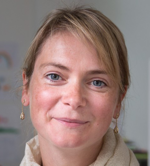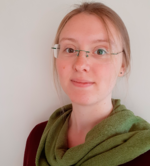
Isabelle Torrance is Principal Investigator for the ERC-funded project CLIC, Professor of Classical Reception in English and Other Modern European Literatures and Cultures, and Director of the Centre for Irish Studies at Aarhus. She earned her PhD in Classics from Trinity College Dublin in 2004 and has previously held teaching and research positions at Trinity College Dublin, the National University of Ireland, Maynooth, the University of Nottingham, the University of Notre Dame (where she was a tenured Associate Professor of Classics), and the Aarhus Institute of Advanced Studies; she has also visited Stanford University on an invited fellowship. In 2021 she was awarded the inaugural Victor Albeck prize for early career research by Aarhus University's Research Foundation. Publications include numerous articles on classical literature and its reception and eight books, most recently Classics and Irish Politics, 1916-2016 (Oxford University Press, 2020) and Classical Antiquity and Medieval Ireland (Bloomsbury, 2024).

Nineteenth-century Irish-language poetry
Ciaran McDonough was awarded a PhD in Irish Studies from the University of Galway in 2017 and earned her MA in Irish Studies from the same institution in 2009, following a BA (Hons) in German and English from Bangor University in 2005. She has previously been a Government of Ireland Postdoctoral Research Fellow in the School of Irish, Celtic Studies and Folklore at University College Dublin (2020-2022) and a Marie Skłodowska Curie Fellow in the Institute for History at the University of Iceland (2022-2024). Her research interests include nineteenth-century antiquarian cultures in Ireland, Iceland, Denmark, and the rest of Europe; the translations of medieval literature in the nineteenth century; comparative history of legal studies; and the intersections between English- and Irish-language culture in nineteenth-century Ireland. She has published widely in these areas. In 2024 she was awarded the Society for the Study of Nineteenth-Century Ireland essay prize.

Daniel Watson holds a PhD in Medieval Irish from the National University of Ireland, Maynooth (2018), and an MA in Classics from Dalhousie University, Canada (2013). He has previously held a visiting fellowship sponsored by the DAAD at the Philipps-Universität Marburg, in Keltologie (2016), and was an Assistant Lecturer in the Department of Early Irish, Maynooth, before his appointment as an O’Donovan Scholar at the Dublin Institute of Advanced Studies (DIAS) in 2019. In 2020 he was awarded the Johann-Kaspar-Zeuss-Prize for the best PhD in Celtic Studies by the Societas Celtologica Europaea. Dr. Watson joined the ERC project CLIC on 1 September 2020 from his position at DIAS, with particular expertise in the vernacular philosophy of early medieval Ireland (c.700-c.1200), and the classical influences on which it drew. Working with the CLIC team until Spring 2023, the primary focus of his research for the project has been a forthcoming collected volume which will provide an overview of Irish receptions of Platonism from the seventh through the twentieth centuries. However, Orosius' influence on Middle Irish historiography has been an important secondary focus. He remains an affiliate of the project but is now a Bergin Fellow at DIAS, where he continues his research on early Irish philosophy.

Gregory R. Darwin earned his PhD in Celtic Languages and Literatures from Harvard University in 2019 after completing a BA double major in Classics and Celtic Studies at the University of Toronto (2013). He has previously taught modern Irish at l’Université de Bretagne Occidentale in Brest. His research interests include maritime folklore in Ireland and Gaelic Scotland and Early Modern and Modern Irish-language literature, and he has published several chapters and articles on these topics. From 1 September 2020-August 2021 for the ERC project CLIC Dr. Darwin examined the use of classical allusion and imitation in the works of Irish-language poets in the seventeenth and eighteenth centuries, especially the works of Dáibhí Ó Bruadair, Aodhagán Ó Rathaille and Seathrún Céitinn. He now holds a position as Senior Lecturer in Irish at Uppsala universitet, where he teaches courses on Irish language and literature, and remains a Research Affiliate on the project.

Ciarán Rua O’Neill holds a PhD in the History of Art from the University of York (2018), with a doctoral thesis on the Caryatid in Britain (1790-1914), having previously completed an MA in the History of Art at the Courtauld Institute of Art (2013), an MPhil in Textual and Visual Studies (2010) and a BA in Classical Civilization and French (2007), both at Trinity College Dublin. Since completing his PhD, he has held teaching positions at University College London (UCL) and the University of Cambridge and has published on the classically inspired work of Frederic Leighton and Alfred Stevens in Sculpture Journal. From September 2021-December 2023, for the ERC project CLIC, Dr O’Neill considered the relationship between classicism in Irish visual culture and the articulation of cultural or political identities during the period c.1750 - c.1950. He is now a Marie Skłodowska-Curie Postdoctoral Fellow in the School of Art History and Cultural Policy at University College Dublin.

Ronan Crowley received his PhD in English from the University at Buffalo in 2014, after completing an M. Litt in English (2008) and a BA in English and Philosophy (2003), both at Trinity College Dublin. From 2014 to 2016, he was Humboldt Research Fellow at Universität Passau and, from 2017 to 2020, was FWO Marie Curie Fellow at Universiteit Antwerpen. In 2021 he was elected Vice President of the International James Joyce Foundation. He has published extensively on Irish modernism and the revival, textual scholarship, and book history, including two co-edited volumes on James Joyce, digital editions of Ulysses and of Joyce’s letters and close to thirty articles and book chapters. For the ERC project CLIC, from 1 September 2021 until Spring 2023, Dr Crowley examined James Joyce’s use of Homeric parallels in Ulysses, and the impact of Joyce’s migrations on this text, drawing on drafts and notebooks to reconstruct Joyce’s wartime access to classical scholarship on the Continent. Dr Crowley is currently a Marie Skłodowska-Curie fellow at Goethe University Frankfurt.

Jeppe Høffner holds an MA in History (2019) and a BA in History and Social Science (2016) from the University of Southern Denmark. His primary research interests are in the history of European imperialism and of public opinion. He examines the interplay between these two fields in the 18th and 19th centuries by analysing the discursive, rhetorical and framing strategies adopted by political actors concerning Europe’s place in a world of burgeoning globalization. His research for the ERC project CLIC, from 1 September 2020 until August 2023, investigated how diverse Irish voices engaged with imperial Britain through the lens of ancient Rome in 18th- and 19th-century Irish newspapers.

Caleb de Jong trained in Canada, completing MA degrees in Literary Studies at Ryerson University (2018) and in Religious Studies at McMaster University (2015) after a BA in Theology from King’s University (2013). His research interests pivot around late 19th-century literature and philosophy, and the ways in which the literary output of this period functions as a touchstone for shifting ideas about politics and religion. For the ERC project CLIC, from Autumn 2020 until Spring 2024, he examined the influence of Platonic philosophy on the Irish Literary Revival through the lens of the visionary poet/painter/philosopher George William Russell (Æ). He aimed to demonstrate how Æ’s enthusiasm for Platonism cannot be dissociated from his revolutionary politics nor from his religious ecumenism, and, moreover, how this enthusiasm connects him with prestigious forbears in the Irish philosophical tradition.

Jonathan Barnes was a PhD Fellow in the Department of English at Aarhus University from 2022 to 2024. He holds a BA (Hons) in Classics from Durham University, an MA in History of Art from University College London and a PGCE in Latin with Classics from the University of Cambridge. His research examined Ovid’s Metamorphoses in relation to ecocritical and posthuman theory, with consideration of the reception of the text in the literature and art of the Anthropocene epoch. During his time at Aarhus University, he populated the project database with Irish literature on Ovidian themes.

Hanna Frederike Wattenberg assisted the CLIC project team with populating the project database from 2020 to 2023. She graduated from the Deutsches Gymnasium für Nordschleswig in Denmark in 2017, and began to study for the BA in Classical Philology at Christian-Albrechts University of Kiel, Germany, the same year. In 2018, after two semesters, she moved to Aarhus where she completed her studies in Classical Philology at Aarhus University.